#episcopalian
Text
"Christianity is the only major world religion to have as its central focus the suffering and degradation of its God. The crucifixion is so familiar to us, and so moving, that it is hard to realize how unusual it is as an image of God."
Churches sometimes offer Christian education classes under the title "Why Did Jesus Have to Die?" This is not really the right question. A better one is, "Why was Jesus crucified?" The emphasis needs to be, not just on the death, but on the manner of the death. To speak of a crucifixion is to speak of a slave's death. We might think of all the slaves in the American colonies who were killed at the whim of an overseer or owner, not to mention those who died on the infamous Middle Passage across the Atlantic. No one remembers their names or individual histories; their stories were thrown away with their bodies. This was the destiny chosen by the Creator and Lord of the universe: the death of a nobody.
Thus the Son of God entered into solidarity with the lowest and least of all his creation, the nameless and forgotten, "the offscouring [dregs] of all things" (1 Cor. 4:13).
—Fleming Rutledge, The Crucifixion: Understanding the Death of Jesus Christ (p.75)

#to speak of a crucifixion is to speak of a slave's death#fleming rutledge#the crucifixion#crucifixion#jesus christ#jesus#episcopalian#progressive christian#progressive christianity#queer christian#liberation theology#theology#christianity#christian
1K notes
·
View notes
Text
Today is All Saints Day, and I'm observing it in a somewhat unconventional manner: cyberbullying the Anglican Church in North America
The ACNA, if you're not familiar, is a group that splintered off from the Episcopal Church in 2009. The reason for the schism was that they believed TEC had "gone astray" by ordaining women priests and affirming LGBTQ people, so a bunch of conservative Episcopalians and clergy split off into their own group: the ACNA. They claim to be "continuing" Anglicans, representing the "real" Anglican tradition in the US and Canada.
The reason I'm cyberbullying them on All Saints Day is because they are conspicuously missing a lovely, pious, respectable, and orthodox Anglican saint: Saint Aelred of Rievaulx (1110-1167 CE)
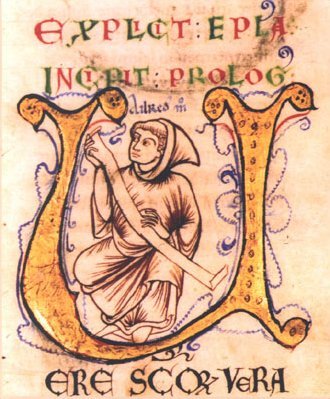
St. Aelred was a monk, abbot, historian, and spiritual writer from Northumbria. During his lifetime, the abbey boasted hundreds of monks and lay brothers, because Aelred was known for his friendly and gentle demeanor, wise leadership, and healthy community. He had the ear of kings and bishops all over northern Europe. He preached charity, humility, chastity, and all kinds of other Christian virtues. In short, he was the very model of a respectable medieval churchman.
He was also Very Much In Love With Men, and he wrote a treatise called "Spiritual Friendship," which might be nicknamed "How To Be In Love With Men In A God-Honoring Way." I've read it. It's wonderful and timeless and also very, very gay. He was in love with men. In a gay way.
Fast forward to the year 1980. Up until this point, St. Aelred had been a somewhat obscure local English saint. And then a groundbreaking new book was published which challenged all conventional narratives surrounding the Church and queer people in the Middle Ages: Christianity, Social Tolerance and Homosexuality by John Boswell. Boswell wrote at some length about Aelred and his love for men, drawing on his other work besides "Spiritual Friendship" and situating him into what was actually something of a "golden age" of gay culture in western Europe. Yes, really.
Fast forward again to the year 1985. At the Episcopal Church's general convention that year, members of Integrity USA (the original LGBTQ advocacy org in TEC) campaigned to have St. Aelred added to the calendar of saints. The House of Bishops agreed, and they added him to the church calendar with full knowledge that Aelred was gay.
Aelred was also physically disabled, and he wrote about his Spiritual Friend becoming "my hand, my eye, the staff of my old age": in other words, his Spiritual Friend was his caretaker as his health declined near the end of his life (which was still quite short even for a medieval person). He also describes the pain of his Spiritual Friend's early death in a way that remains tender 800 years later. I will leave you to imagine why that might be spiritually relevant to a bunch of nice church gays in 1985.
Fast forward again to 2009. The conservative wing of the Church has had enough of TEC's bleeding-heart liberal reforms, so they secede from the union leave and establish their own church without any icky queers or women priests. St. Aelred had been an official Episcopal saint for 25 years at that point, and the newly-formed ACNA had to consciously, deliberately choose to remove him from their calendar of saints.
Fast forward again to earlier this summer. I start doing research into queer Christian history and queer saints. I realize that Aelred is conspicuously missing from the ACNA's calendar, so I look into the background and decide to get obnoxious about it on Instagram. Because this is VERY embarrassing for a church that claims to be the "real" Anglican Church in North America.
A selection of memes for your enjoyment:

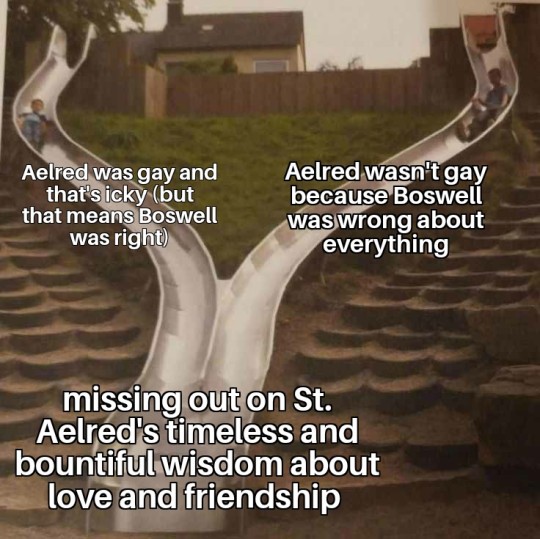


266 notes
·
View notes
Text
AAAAHHHHH I LOVE BEING ANGLO-CATHOLIC I LOVE LITURGY I LOVE SACRAMENTS I LOVE THE BOOK OF COMMON PRAYER I LOVE INCENSE AND CANDLES AND PSALMS AND HYMNS AND THE ORGAN AND ROSARIES AND QUEERNESS AND GOD GOOD LORD!!!!!!
#having a normal one#it's insane how liberating it feels finding a path that just. fits. it works.#christianity#progressive christian#progressive christianity#christian#episcopal#episcopalian#lgbt christian#anglo catholic#anglo catholicism#anglo-catholic#anglo-catholicism
100 notes
·
View notes
Text
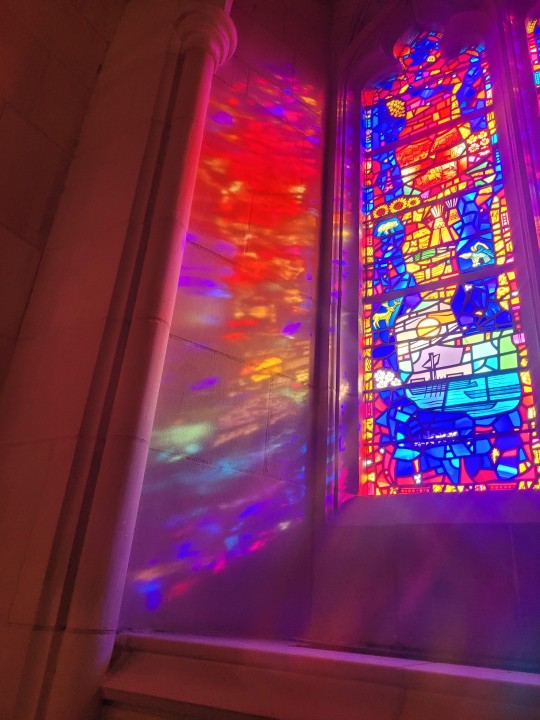

I went to the Washington National Cathedral :)
157 notes
·
View notes
Text









S. Mary's Cathedral, Edinburgh
#dark academia#moodboard#scotland#scottish#edinburgh#episcopalian#anglican#Christian#dark academia aesthetic#darkest academia#light academia#dark academia moodboard#academia aesthetic#academia#historic architecture#history#scottish history#architecture#churches#cathedrals#gothic architecture#church architecture#chaotic academic aesthetic#student#university#college#studying#edinburgh student#heraldry#gloomy
187 notes
·
View notes
Text
here it is again, my favorite day of the year. we remember today, we are borrowing dirt. you are not above creation; you are a part of it. you are not living on Earth; you belong to Her, you are a piece of Her. you are dust breathing; you are the ashes of a thousand forest fires, the stuff built from the corpses of stars. you are made and guided by the Force that controls life and death, beginnings and ends, and the pathways in between. death is not a curse, it is a phase of being: a roadway between states of consciousness. you'll return back to where you once were. but God has decided that you should get to be of a separate consciousness; God made you alive and human. do well with that and be grateful. and remember today to whom you belong, where you come from, and where you are going.
i hope the Divine may resonate in your life today in a way that you can see. (the Divine is always there; i hope today your eyes may be open to it.)
#ash wednesday#words words words#metaphysics#episcopalian#god posting#conciousness#christian animism#mysticism#find the divine#christopagan
128 notes
·
View notes
Text
“Americans, steeped in the ideal of religious freedom, take it for granted that orthodoxy without room for heresy is dangerous. Think of the Inquisition, they say, or the trial of Galileo, or (a little closer to home) the Puritan witch hunts. Yet heresy without room for orthodoxy turns out to be dangerous as well. Many of the overlapping crises in American life, from our foreign policy disasters to the housing bubble to the rate of out-of-wedlock births, can be traced to the impulse to emphasize one particular element of traditional Christianity—one insight, one doctrine, one teaching or tradition—at the expense of all the others. The goal is always progress: a belief system that’s simpler or more reasonable, more authentic or more up-to-date. Yet the results often vindicate the older Christian synthesis. Heresy sets out to be simpler and more appealing and more rational, but it often ends up being more extreme.”
Ross Douthat, “Bad Religion”
69 notes
·
View notes
Note
One million dollar question: is it true that the Bible condems homosexuality? I had a discussion with two conservatives who sent me some verses that seem to confirm that but i don't know much about the context although i know this is important too
Let’s start here: why is this the million dollar question? Why does it matter what the Bible has to say about sex, or love, or human relationships? At the end of the day, it’s just a book, right?
Oceans of ink (and blood) have been spilled over not only what the Bible says, but what it does, how it functions. The course of empires, nations, and families have been shaped by the contents of this book, and from a historical and cultural perspective, it holds a lot of weight. But you didn’t ask about the sociological, you asked about the theological, so let’s explore.
Different Christian traditions vary in their approach to scripture. For example: some Protestant denominations believe that the Bible is inspired, inerrant, and infallible. In this paradigm, God is the ultimate author of scripture working through human hands, and the resulting text is both without error and in no way deceptive or mistaken. Similarly, The Second Vatican Council decreed that “the books of Scripture must be acknowledged as teaching solidly, faithfully and without error that truth which God wanted put into sacred writings for the sake of salvation.” When a member of the clergy is ordained into the Episcopal Church they swear that they “do believe the Holy Scriptures of the Old and New Testaments to be the Word of God, and to contain all things necessary to salvation.”
Can you see how many of these points of doctrine overlap yet seek to distinguish themselves from one another? Theologians have spent lifetimes arguing over definitions, and even when they manage to settle on solid teachings, the way that the teaching is interpreted by the clergy and incorporated into the lives of the laity varies WIDELY. As much as systematic theology may try, humans aren’t systematic beings. We’re highly contextual: we only exist in relation to others, to history, to circumstance, and to the divine. We simply cannot call up God to confirm church teaching, and I think a lot of people cling excessively to the Bible as a result of the ache (dare I even say trauma) of being separated from God via space and time in the way we currently are.
God is here, but God is not here. God is within us, God is within the beloved, God is within the sea and sky and land, and yet we cannot grasp God to our bodies in the way we long to. In this earthly lifetime, we are forever enmeshed in God, yet forever distinct, and that is our great joy and our great tragedy.
So barring a direct spiritual experience or the actual second coming, we're left to sort through these things ourselves. And because humans are flawed, our interpretations will always be flawed. Even with the presence of the Holy Spirit in our lives guiding us.
When engaging with any sort of Biblical debate, it is essential that you have a strong understanding of what the Bible means to you, an an embodied individual living a brief little awful and wonderful life on Earth. Otherwise it's easy to get pushed around by other people’s convincing-sounding arguments and sound bites.
Here’s where I show my hand. As a confirmed Episcopalian I believe that reason, tradition, and scripture form the “three-legged stool” upon which the church stands, interdependent and interrelational to each other, but I’ve also like, lived a life outside of books. I’ve met God in grimy alleyways and frigid ocean waters and in bed with my lovers. So my stool is actually four-legged, because I think it’s essential to incorporate one’s personal experience of God into the mix as well. (I did not invent this: it’s called the Wesleyan quadrilateral, but the official Wesleyan quadrilateral insists that scripture must trump all other legs of the table in the case of a conflict which...*cynical noises*)
Please do not interpret this answer as me doing a hand-wavey "it's all vibes, man, we're all equally right and equally wrong", but I do absolutely think we have a responsibility as creatures to weigh the suffering and/or flourishing of our fellow creatures against teachings handed down through oral tradition, schisms, imperial takeover of faith, and translation and mistranslation. Do I believe the Bible is sacred, supernatural even, and that it contains all things necessary to find one's way to God, if that is the way God chooses to manifest to an individual in a given lifetime? Absolutely. Do I believe it is a priceless work of art and human achievement that captures ancient truths and the hopes of a people (as well as a record of their atrocities) through symbols, stories, and signs? Unto my death, I do.
However, I am wary of making an object of human creation, God-breathed though it may be, into an idol, and trapping God in its pages like God is some sort of exotic bug we can pin down with a sewing needle.
Finally, we have reached the homosexuality debate. One of my favorite sayings of Jesus is Matthew 5: 15-17: "Beware of false prophets, who come to you in sheep's clothing but inwardly are ravenous wolves. You will know them by their fruits. Are grapes gathered from thorns, or figs from thistles? In the same way, every good tree bears good fruit, but the bad tree bears bad fruit." In other words: look at what religious teachings have wrought in the world. When I look at homophobic interpretations of the Bible, I see destruction, abuse, suffering, neglect, alienation, spiritual decay, and death. When I look at theology that affirms the holiness of LGBTQ+ relationships, I see joy, laughter, community building, thoughtful care, blooming families, creativity, resilience, and compassion. I see the love of Christ at work in the world. I see the hands of a God who chose under no duress to take up residence in a human body, to drink wine with tax collectors and break bread with sex workers and carry urchin children around on his shoulders. That's my limited little pet interpretation, but hey, that's all any of us really have, at the end of the day.
So, I am absolutely happy to do a play-by-play breakdown of why those passages you were given (we queer Christians often call them "clobber passages" or "texts of terror") don't hold water in a theological, historical, and cultural context. We can talk about Jesus blessing the eunuch and the institution of Greek pederasty and Levitical purity laws and Paul because I've done that reading. I've spent my nights crying in self-hatred and leafing through doctrine books and arguing with my pastors and writing long grad school essays on the subjects. Send me the verses, if you can remember them, and I'll take a look. But it's worth noting that out of the entire Bible, I believe there are only six that explicitly condemn homosexuality AND I'm being generous and including Sodom and Gommorah here, which is a willful and ignorant misreading if I've ever seen one.
In the meantime, I recommend books by people smarter than me! Try Outside The Lines: How Embracing Queerness Will Transform Your Faith by Mihee Kim-Kort, or Does Jesus Really Love Me by Jeff Chu, or Transforming: The Bible and the Lives of Transgender Christians by Austen Hartke!
And take a breath, dear one. Breathe in God, in the droplets of water in the air and in the wind from the south. Breathe in the gift of life, and know that you are loved, now and unto the end of the age and even beyond then.
#I'm sorry this answer is the length of a Victor Hugo novel but I've been mulling on it for days and it unlocked the theology gremlin#who lives in my brain#theology#christianty#queer christianity#progressive christianity#religionposting#catholicism#episcopalian#lgbtq community
44 notes
·
View notes
Text
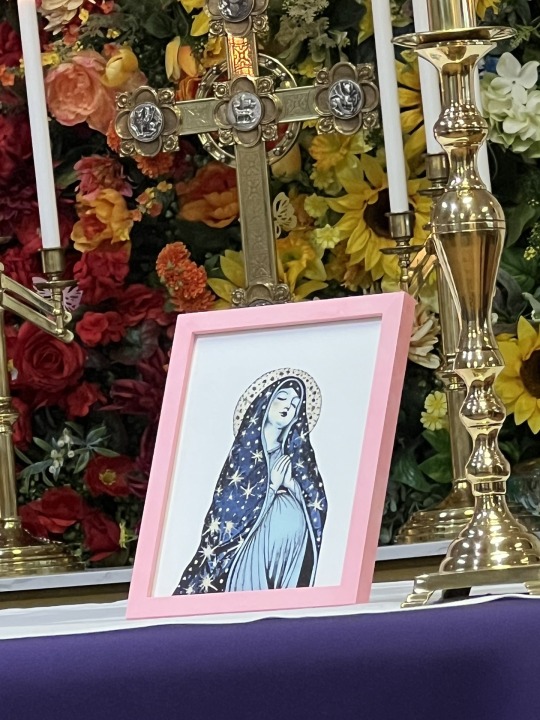
Blessed Mother Mary at my church 💗
#episcopal#episcopalian#episcopal church#christian#christianity#progressive christian#progressive christianity#pro lgbt#mother mary
23 notes
·
View notes
Text
There's a curious but popular notion circulating around the church these days that says God would never stoop to using ancient genre categories to communicate. Speaking to ancient people using their own language, literary structures, and cosmological assumptions would be beneath God, it is said, for only our modern categories of science and history can convey the truth in any meaningful way.
In addition to once again prioritizing modern, Western (and often uniquely American) concerns, this notion overlooks one of the most central themes of Scripture itself: God stoops. From walking with Adam and Eve through the garden of Eden, to traveling with the liberated Hebrew slaves in a pillar of cloud and fire, to slipping into flesh and eating, laughing, suffering, healing, weeping, and dying among us as part of humanity, the God of scripture stoops and stoops and stoops and stoops. At the heart of the gospel message is the story of a God who stoops to the point of death on a cross.
Dignified or not, believable or not, ours is a God perpetually on bended knee, doing everything it takes to convince stubborn and petulant children that they are seen and loved. It is no more beneath God to speak to us using poetry, proverb, letters, and legend than it is for a mother to read storybooks to her daughter at bedtime. This is who God is. This is what God does.
—Rachel Held Evans, Inspired, p.11-12
#rachel held evans#christianity#biblical interpretation#god#progressive christian#the bible#christian#bible#quotes#episcopalian
618 notes
·
View notes
Text
For St. Aelred's feast this year I did a bunch of original research and wrote a monster of a paper. It's very cool. You should check it out.
It turns out that when you apply concepts like "intersectionality" and "dialectical materialism" to Aelred's sexuality, you can verify a stunning amount of information about the role that sexuality played in his life. Also, his modern history is directly tied to the AIDS crisis.
Enjoy, and let me know what you think!
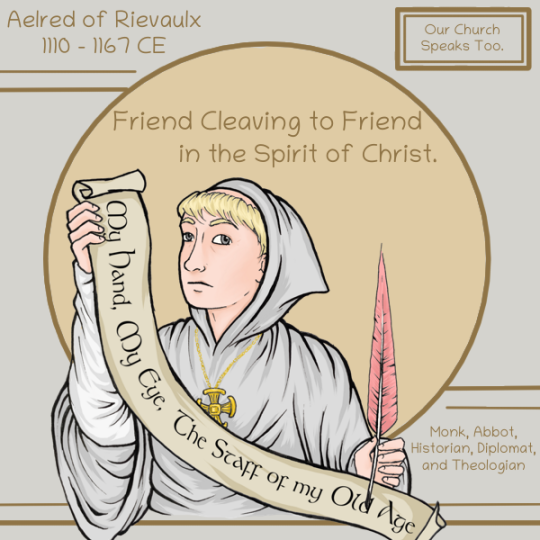
62 notes
·
View notes
Text
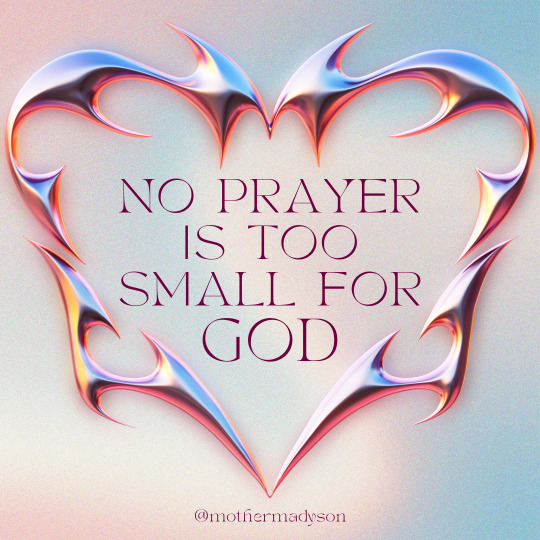
i think i need to get better at praying. i'm generally bad at asking for what i want or need, even in my daily life, but sometimes i feel like it's even harder for me to talk to God about things. perhaps it's because i feel my problems are so minuscule that there's no way they could possibly care. i mean, why should an immortal, creative being care about the personal goings-on of just one of their creations? God does care, though. God, in his infinite love, has room for each and every one of our concerns, and he's so observant and attentive to his children that he can see even the most microscopic of problems. nothing is too big or too small for God.
#christianity#progressive christianity#episcopal#episcopalian#queer christian#lgbt christian#bible verses
30 notes
·
View notes
Text
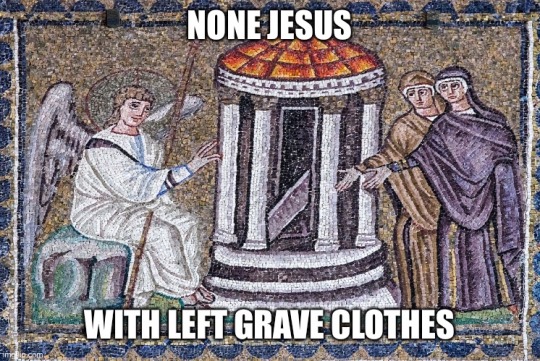
Hi can I get uhhhhh some first fruits of those who have fallen asleep
#happy Easter y’all#since this made some of you laugh last night I did it for realsies#the means of grace and the hope of glory#Christianity#anglican#Episcopalian#Easter
16 notes
·
View notes
Text
I was talking about my daily prayer routine to my therapist and tried to explain the book of common prayer. she smiled and said "sounds like a good book" and yes!! it is!!!
#episcopalian#anglican#I went to a new church today that actually uses the bcp instead of printing everything in the bulletin and really enjoyed it
20 notes
·
View notes
Note
Do you think God really is like the Abrahamic God? Or maybe there are some differences?
I do, yes.
There's a lot of variation just within the Abrahamic faiths about what the Abrahamic God "is like". But then, God is not the way he appears. The Bible says that God stoops to meet us where we are. Somehow this eternal incomprehensible Essence that formulated and shepherds the universe makes itself perceivable by man, or at least able to be communicated with by man. The only way to do that is to "simplify" itself. God to me is not all God is. I am not wide enough for that; I don't have enough eyes or neurons.
Yes, I think God is the Abrahamic God. but I do not claim to be able to know that God is not also capable of his own difference within himself.
The Abrahamic God is real enough to teach me to forgive my father despite it all, real enough to lead me to looking at the cosmos with curiosity, real enough to make me understand that we can save ourselves with Love; I do not need Him to be any realer than that.
Maybe in time, as my eyes age, I will come to know God as something else within or without any of the Abrahamic understandings. I don't fear that. But yes, I believe in Abraham and Sarah's God.
10 notes
·
View notes
Text

106 notes
·
View notes